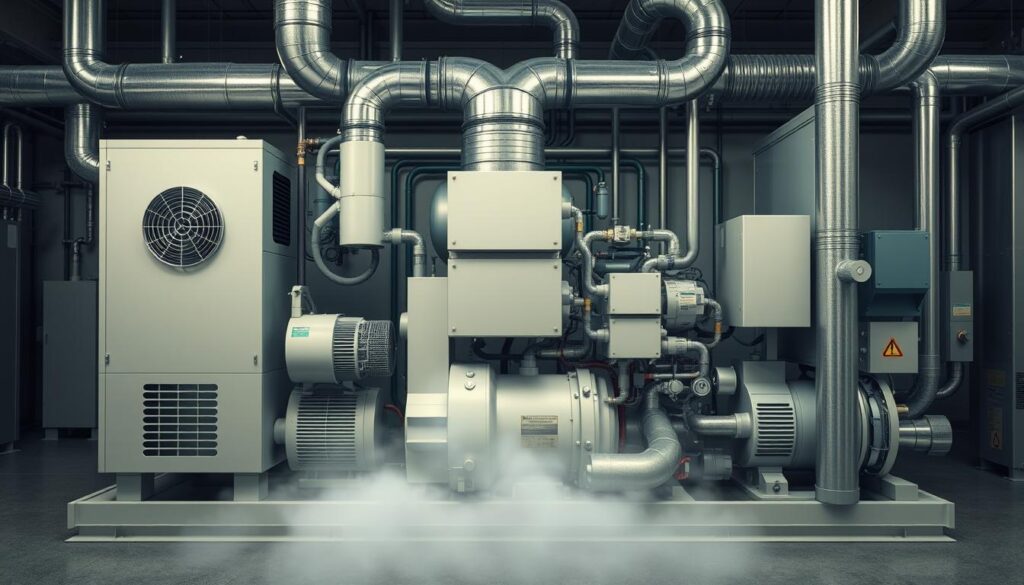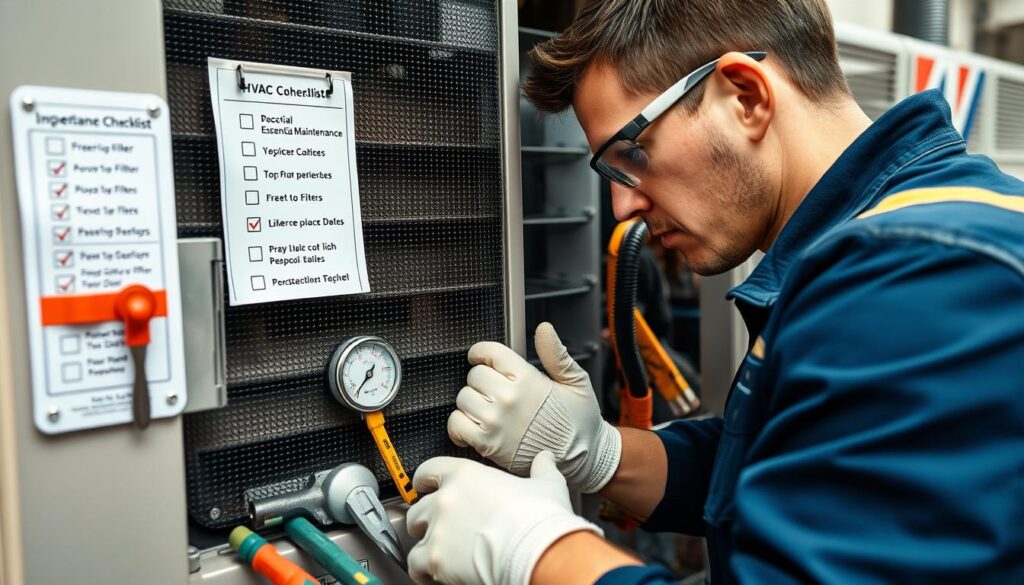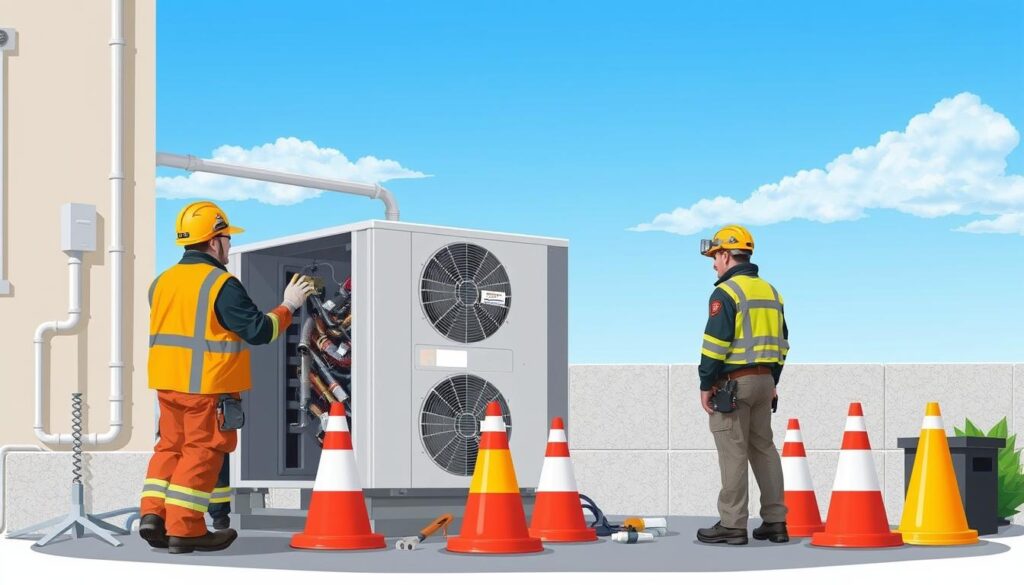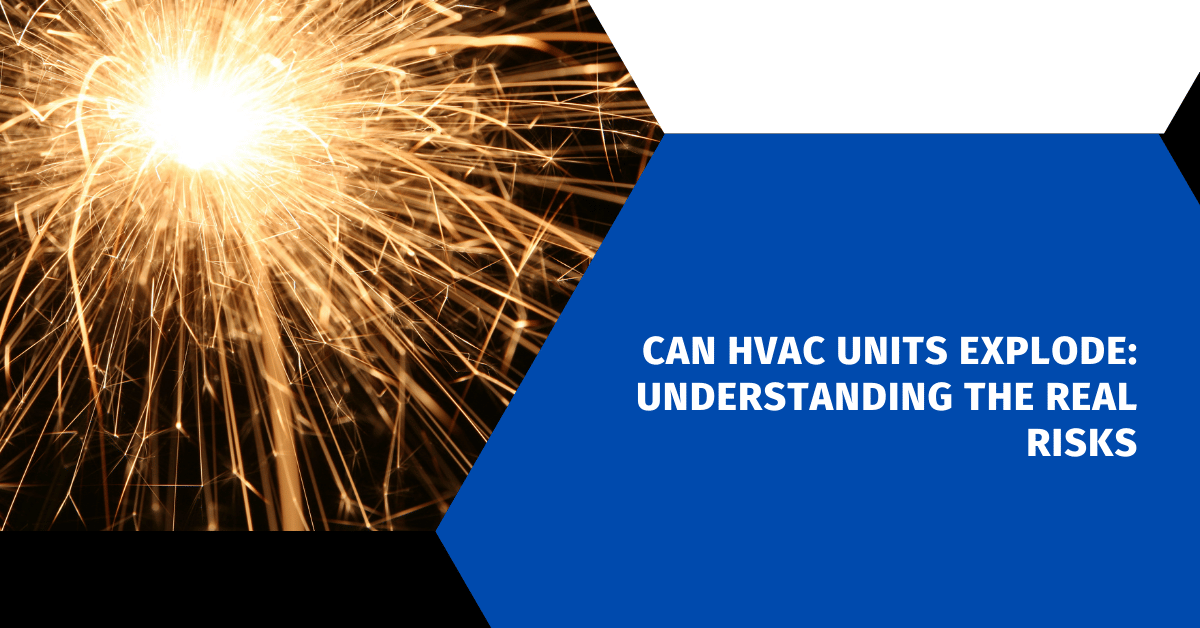Affiliate Disclosure
HVAC Guide Guys is a participant in the Amazon Services LLC Associates Program, an affiliate advertising program designed to provide a means for sites to earn advertising fees by advertising and linking to Amazon.
Can HVAC Units Explode? Ever thought about your home’s HVAC system suddenly exploding? This could cause huge damage and danger to your family. But, the truth is not as dramatic as it sounds. We’ll explore the real dangers of HVAC systems and clear up myths about them exploding.

Key Takeaways
- HVAC units rarely explode, but they can still be dangerous. This is due to electrical issues, refrigerant leaks, and mechanical problems.
- Today’s HVAC systems have many safety features. These include pressure relief valves and thermal overload protectors to prevent big failures.
- What looks like an explosion is often just an electrical short, capacitor failure, or compressor problem. It’s not a real explosion.
- It’s important to keep your HVAC system in good shape. Regular checks can find and fix problems before they become big issues.
- Knowing the real risks of HVAC systems helps you keep your home safe. It ensures your climate control equipment lasts a long time.
Table of Contents
Understanding How HVAC Systems Work
HVAC stands for Heating, Ventilation, and Air Conditioning. It’s a key system in many homes and buildings. At its core is the refrigeration cycle, which moves heat from inside to outside. This cycle has several important parts, each crucial for the system’s operation and efficiency.
The Refrigeration Cycle
The refrigeration cycle is the heart of HVAC systems. It has four main stages: compression, condensation, expansion, and evaporation. The refrigerant, a special chemical, goes through these stages. It absorbs heat from inside and releases it outside, cooling the space.
Key Components and Their Functions
- Compressor: Compresses the refrigerant, raising its temperature and pressure.
- Condenser Coils: Dissipate the heat from the refrigerant, causing it to condense into a liquid.
- Expansion Valve: Reduces the pressure and temperature of the liquid refrigerant.
- Evaporator Coils: Absorb heat from the indoor air, causing the refrigerant to evaporate and return to a gaseous state.
Safety Features in Modern Systems
Modern HVAC systems have many safety features. These include pressure relief valves, thermal overload protectors, and circuit breakers. They are designed to keep the system and users safe. Knowing about these safety measures can ease worries about explosions or malfunctions.
“HVAC systems are designed with multiple layers of safety features to ensure reliable and safe operation. These measures help prevent potential issues like explosions or other catastrophic failures.”
Learning about the refrigeration cycle, key components, and safety features of HVAC systems is helpful. It shows the engineering behind these important appliances. This knowledge can also help you spot warning signs and address safety concerns about your HVAC unit.
Explore Our HVAC Shop
Looking for top-rated HVAC tools, parts, and accessories? Visit our shop and find the perfect solution for your needs.
Visit the ShopThe Truth About HVAC Explosions: Separating Fact from Fiction
Many people think HVAC explosions happen often, but they’re really rare. Most “explosions” are actually other electrical issues or system malfunctions. Modern HVACs use safer, less flammable refrigerants and follow strict safety rules, making big failures less likely.
Knowing the difference between real HVAC explosions and other failures is key. It helps you keep your HVAC system reliable and safe. By clearing up myths, you can focus on keeping your air conditioning safe.
| HVAC Explosion Myths | The Truth |
|---|---|
| HVAC units can spontaneously explode. | Actual HVAC explosions are extremely rare and often misattributed to other system failures. |
| Older HVAC systems are more prone to explosions. | Advancements in safety features and refrigerant technology have greatly reduced explosion risks in modern HVAC units. |
| HVAC explosions are a common occurrence. | With proper maintenance and installation, the likelihood of an HVAC explosion is minuscule. |
By understanding the real HVAC explosion myths and the facts, you can make smart choices about your HVAC. This way, you can stay safe without falling for common myths.
Explore Our HVAC Shop
Looking for top-rated HVAC tools, parts, and accessories? Visit our shop and find the perfect solution for your needs.
Visit the ShopCan HVAC Units Explode: Common Risk Factors
HVAC systems are made to be safe. But, some risks can lead to problems like explosions. Knowing these risks helps keep your air conditioning system working well.
Electrical System Failures
Bad wiring, too much load on circuits, and voltage changes can harm your HVAC’s electrical system. These problems can cause fires and explosions. It’s key to keep your system well-maintained and installed by pros.
Pressure-Related Issues
HVAC systems need the right pressure to work right. Problems like a bad compressor or blocked lines can make the system unstable. This can lead to explosions. Regular checks and quick fixes are vital to keep the system balanced.
Refrigerant Problems
The refrigerant in HVAC systems is very important. Leaks, wrong handling, or the wrong refrigerant can cause big problems. It’s crucial to handle refrigerants correctly for safety.
To avoid HVAC explosions and safety issues, regular maintenance is key. Choose skilled technicians for work and fix problems fast. These steps help keep your HVAC system safe and efficient.
Warning Signs of HVAC System Failure
It’s important to spot early signs of HVAC system failure. This helps avoid bigger problems and safety risks. By keeping an eye on your system, you can fix issues before they get worse. Let’s look at some common HVAC failure symptoms and air conditioning warning signs.
Strange noises like grinding or squealing mean something’s wrong inside. This could be worn parts or loose components. Weak airflow from vents can be due to clogged filters or fan problems. Both can make your home less comfortable and increase your energy bills.
Bad smells, like burning or musty odors, can mean moisture issues or mold. They could also point to overheating or wiring problems. These need quick attention to avoid dangers.
Thermostat problems, like temperature changes or not working, need a pro to fix. These issues can come from many HVAC system troubleshooting problems.
Quick cycling, where the system turns on and off fast, can wear it out. It’s often caused by dirty coils or clogged filters. Water leaks around the HVAC unit can damage your home, usually due to refrigerant or condensate line issues.
If you see any of these signs, call a qualified HVAC technician. They can find and fix the problem before it gets worse. Catching HVAC failure symptoms early helps keep your system running well. It also keeps your home safe and comfortable.
| Warning Sign | Potential Cause | Potential Impact |
|---|---|---|
| Unusual Noises | Worn parts, loose components | System stress, potential damage |
| Weak Airflow | Clogged filters, obstructions | Comfort issues, higher energy bills |
| Unpleasant Odors | Moisture, mold, overheating | Potential safety hazards |
| Thermostat Issues | Malfunctions, wiring problems | Comfort and efficiency issues |
| Quick Cycling | Dirty coils, clogged filters | Increased wear and tear, higher bills |
| Water Leaks | Refrigerant issues, clogged drains | Moisture damage, mold growth |
“Recognizing the early warning signs of HVAC system failure is crucial to preventing more serious issues and potential safety hazards.”
Explore Our HVAC Shop
Looking for top-rated HVAC tools, parts, and accessories? Visit our shop and find the perfect solution for your needs.
Visit the ShopCritical Components Most Prone to Failure
Some parts of your HVAC system are more likely to fail. This can hurt how well it works and even make it unsafe. Knowing which parts are at risk and why is key to keeping your system running right and safe.
Compressor Issues
The compressor is the heart of your HVAC system. It moves the refrigerant and cools your space. But, compressors can face problems like overheating and mechanical wear. These can cause loud noises, lower efficiency, and even a risk of explosion.
Capacitor Malfunctions
Capacitors are important for your HVAC system. They help power the system’s parts. But, if they fail, you might see electrical problems. This can lead to issues like the system not working right or even a fire risk.
Coil System Problems
The coil system is key for cooling. It can get dirty, leak refrigerant, and face other problems. These issues can make your system less efficient and more stressed. They can also lead to other failures.
Keeping these important parts clean and checked is crucial. It helps your HVAC system last longer and stay safe. If you ignore these tasks, you risk more failures and even explosions.
“Proper maintenance is the key to preventing HVAC component failures and ensuring the long-term reliability and safety of your system.”
Essential Maintenance Practices for HVAC Safety
Keeping your HVAC system in good shape is key for safety and efficiency. Regular filter changes and professional checks are vital. These steps help avoid dangers and make your HVAC last longer. Here are some important tips to keep your HVAC system working well.
Prioritize HVAC Maintenance
- Change air filters often to keep air flowing well and avoid system problems.
- Get professional HVAC checks yearly to catch and fix issues early.
- Clear the outdoor unit area of debris and plants to ensure good airflow.
- Don’t put flammable things like gasoline or paint near your HVAC to avoid fires.
- Let your HVAC system rest during heavy use to prevent overheating and explosions.
Homeowner Maintenance Tasks
Homeowners can do some basic HVAC upkeep. This includes changing filters, cleaning the outdoor unit, and watching for odd noises or performance changes. But, it’s best to leave complex maintenance and repairs to experts. They ensure your safety and the system’s reliability.
| HVAC Maintenance Task | Homeowner Responsibility | Professional HVAC Technician |
|---|---|---|
| Filter Replacement | ✓ | |
| Coil Cleaning | ✓ | |
| Refrigerant Level Checks | ✓ | |
| System Inspections | ✓ | |
| Repairs and Maintenance | ✓ |
By following these HVAC maintenance tips, you can keep your air conditioning safety measures and HVAC system in good shape. This reduces risks and makes your HVAC last longer.

Explore Our HVAC Shop
Looking for top-rated HVAC tools, parts, and accessories? Visit our shop and find the perfect solution for your needs.
Visit the ShopProfessional Installation and Regular Inspections
Keeping your HVAC system safe and lasting long needs skilled HVAC professionals. Getting it installed right and checking it often are key. They help avoid risks and keep your home cozy.
Choosing Qualified Technicians
When picking an HVAC technician, check their qualifications and experience. Make sure they’re licensed, certified, and trained for your system. Experts can spot and fix problems early, saving you trouble later.
Inspection Checklist Items
- Thorough examination of the electrical system, including wiring and connections
- Refrigerant level testing and leak detection
- Comprehensive inspection of all HVAC components, such as the compressor, coils, and fans
- Verification of proper ventilation and airflow
- Evaluation of safety features and their proper functioning
Documentation Requirements
Keeping records is vital for warranty and system history. Your HVAC professional should give you detailed records. This includes installation, air conditioning inspections, and any fixes or upkeep.
Regular checks and HVAC professional installation catch problems early. This keeps your home comfy and safe. By choosing the right techs and following a detailed checklist, your HVAC system will run smoothly.
Emergency Response and Safety Protocols
When HVAC emergencies happen, quick action is key. It keeps people safe and stops more damage. HVAC emergency plans should be clear and easy to find for everyone.
The first thing to do is turn off the HVAC system and cut the power. This reduces the chance of electrical dangers or explosions. If needed, get out of the area and call for help, like the fire department or gas company.
Having an electrical fire extinguisher nearby is also important. Know where it is and how to use it. It can help control the situation until help arrives.
Creating a family emergency plan is a good idea. It should cover what to do in HVAC emergencies. The plan should include steps to take, a meeting spot, and emergency contact numbers.
After an HVAC issue, get a pro to check the system before turning it back on. This makes sure it’s safe and working right, avoiding more problems.
By being ready and following HVAC emergency procedures, we can lower risks. This keeps everyone safe and sound.

Conclusion
True HVAC explosions are rare, but system failures can still be dangerous. Knowing how HVAC systems work and recognizing warning signs are key. Regular maintenance and professional installation help keep your system safe and reliable.
Getting your HVAC checked by certified technicians is vital. They can spot problems early and fix them. Keeping air filters clean and ensuring good ventilation around outdoor units also helps.
Don’t ignore strange sounds, smells, or changes in how your system works. Fixing these issues quickly can prevent bigger problems. Following these safety tips will make your air conditioning system safe and efficient.
Remember, taking care of your HVAC system is crucial for your family’s safety. It also helps your system last longer and saves you money.

